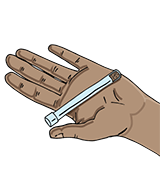Single Dose of Modafinil Improved Memory in People in Remission from Depression
 Modafinil is a wake-promoting medication used to treat narcolepsy, but studies have also shown that it can improve cognition in people with schizophrenia or attention deficit hyperactivity disorder. It may also help people with lingering cognitive difficulties after recovering from a depression. A 2016 article in the journal Biological Psychiatry reported that a single 200mg dose of modafinil improved performance on tests of episodic memory and working memory (but not planning or attention).
Modafinil is a wake-promoting medication used to treat narcolepsy, but studies have also shown that it can improve cognition in people with schizophrenia or attention deficit hyperactivity disorder. It may also help people with lingering cognitive difficulties after recovering from a depression. A 2016 article in the journal Biological Psychiatry reported that a single 200mg dose of modafinil improved performance on tests of episodic memory and working memory (but not planning or attention).
The study by researcher Barbara Sahakian and colleagues included 60 patients who had recently recovered from a depression. They took some cognitive tests to establish a baseline of their performance. A week later, they were given either a placebo or a single dose of modafinil, and two hours later they completed the cognitive tests again. The modafinil group performed better on the memory-related tasks.
While side effects were limited, two participants who received modafinil had sleep disturbances that night.
Longer-term studies are needed to determine whether modafinil is safe and effective if taken over a longer period of time. Cognitive dysfunction can interfere with daily tasks such as work or school and put people at greater risk of relapse, so effective treatments have the potential to greatly improve quality of life for people in remission from depression.
Modafinil May Help Cocaine Users Prevent Relapse
 There is currently no Food and Drug Administration–approved treatment for cocaine addiction. One reason may be that in studies of treatments for cocaine use, participants may have a wide variety of exposure to cocaine. Some may be regularly using cocaine, while others may have gone some time without using the drug. A recent study by Margaret Haney and colleagues addressed some of these challenges by comparing the addiction treatment modafinil to placebo in different scenarios—such as when cocaine users have access to cheap cocaine versus expensive cocaine—and determining under which circumstances modafinil reduces the use of smoked cocaine.
There is currently no Food and Drug Administration–approved treatment for cocaine addiction. One reason may be that in studies of treatments for cocaine use, participants may have a wide variety of exposure to cocaine. Some may be regularly using cocaine, while others may have gone some time without using the drug. A recent study by Margaret Haney and colleagues addressed some of these challenges by comparing the addiction treatment modafinil to placebo in different scenarios—such as when cocaine users have access to cheap cocaine versus expensive cocaine—and determining under which circumstances modafinil reduces the use of smoked cocaine.
In the study, presented at a scientific meeting in 2015, Haney and colleagues reported that among people who were not currently smoking cocaine, modafinil reduced cocaine use compared to placebo, but modafinil did not reduce cocaine use among people who had recently smoked cocaine. Modafinil also reduced cocaine use when the drug was expensive, but not when participants had access to cheap $5 cocaine. According to the researchers, these findings suggest that modafinil may be more useful at preventing relapse than at helping current users of cocaine achieve abstinence.
Editor’s Note: While they are not FDA-approved, two other treatments can reduce cocaine use, according to placebo-controlled studies: the antioxidant N-acetylcysteine (NAC) and the anticonvulsant topiramate.

